Embden goose is one of the oldest domestic goose breeds, with records of it dating back about 200 years. The origin of this breed is not clear. Some believe that the breed was created by crossing the German white with the English White.
And then, by a process of careful selections created the goose as it is today. Others suggest that great size and weight of the English Embden goose was produced by selective breeding with the Toulouse goose breed.
According to other history, the breed is thought to be from the North Sea region, in the Netherlands and Germany. But most probably, the Embden goose was originated from the town of Embden in Lower Saxony, Germany.
Today the Embden goose are the most common goose breed used for commercial meat production, because their large size, white feathers and fast growth rate.
The breed is also known by some other names. They are known as Emden or Bremen in America, Emder Gaense or Emdener Gaense in Germany, and L’oies d’Emden in France and Belgium. Sometimes, they are also called White Embden Goose.
Embden goose were first brought to the United States in 1821. And the breed was admitted into the American Poultry Association’s Standard of Perfection in the year of 1874 and entered into the British Poultry Standard in 1865. Review Characteristics, breed profile and breed facts about Embden goose below.
Embden Goose Characteristics
Embden goose is classed as a heavy breed by the American Poultry Association. It is one of the tallest goose breed with a massive and long body. They have long swan neck with the double lobes not touching the ground. Their plumage color is completely white.
They have a short, light orange bill. Their feet and shanks are also orange in color. Their head is oval-shaped and their legs are fairly short. The Embden goose have a long and graceful neck. Their body is bulky and well rounded. Their tail is short and they have a long back.
Their eyes are an ocean blue. The wings of these birds are of a good length and are very strong. The feathers in their wings are close and very hard. On average, Embden ganders weight about 14 kg and goose about 9 kg.
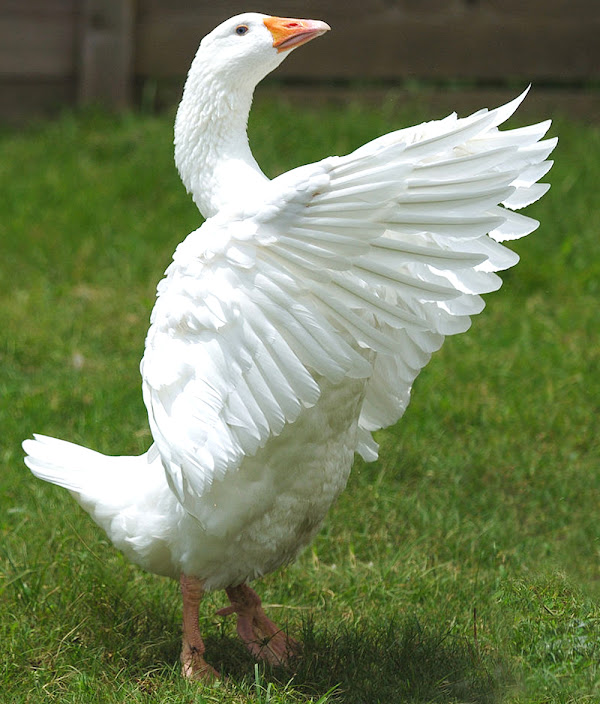
Uses
Embden goose are mainly kept for meat production. They are heavy in size and very good for commercial meat production. The breed grows faster and is a popular goose breed for meat production.
Special Notes
It is a very hardy breed. They are fast growers and mature early. Usually, an Embden goose matures within about 2-3 years and will start to look for a mate for life. They are not good layers, and lay only 20-30 eggs per year. Their eggs are very large in size, weighting about 170 grams. Their eggs are white in color.
Embden goose are broody and they start incubating the eggs around the beginning of spring. The incubation period for their eggs is about 28-34 days. They are excellent mothers and are very protective against predators.
These goose are good foragers. And their habits are to forage for tidbits in the grass and water. They are herbivores and prefer to live near some water. They are cold hardy and can do well in fairly mild sub-zero temperatures.
The Embden ganders are more vocal than the females. And the ganders can often be heard honking loudly if approached. But the females are generally talk quietly throughout the day. As they have strong wings, so they can fly but don’t migrate.
Embden ganders can be aggressive sometimes, but they are good for alarming dangers. Review full breed profile of this goose breed in the chart below.
| Breed Name | Embden |
| Other Name | The breed is known as Emden or Bremen in America, Emder Gaense or Emdener Gaense in Germany, and L’oies d’Emden in France and Belgium. |
| Breed Purpose | Meat |
| Special Notes | Very hardy, great foragers, ganders can be aggressive |
| Breed Class | Heavy |
| Broodiness | Average |
| Weight | Standard weight is about 14 kg for males and about 9 kg for females |
| Climate Tolerance | All Climates (cold hardy) |
| Egg Color | White |
| Egg Size | Extra Large (about 170 grams) |
| Egg Productivity | Poor (20-30 eggs per breeding season) |
| Flying Ability | Good. But they usually don’t migrate |
| Rarity | Common |
| Varieties | White |
| Country of Origin | Germany |


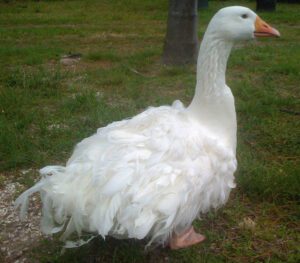
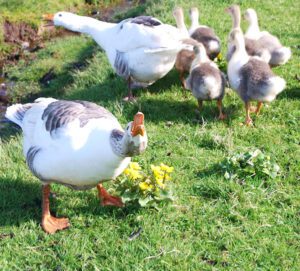
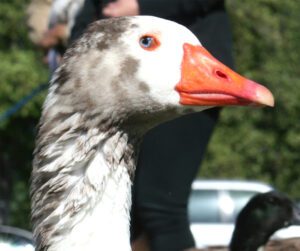
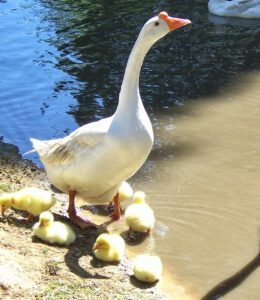
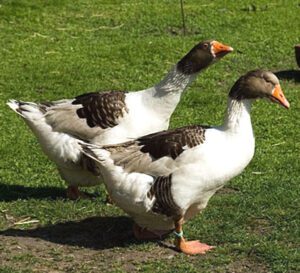
I am new in raising birds. But I really like this breed. Recently I have purchased 1 male and 3 females. All are good now.